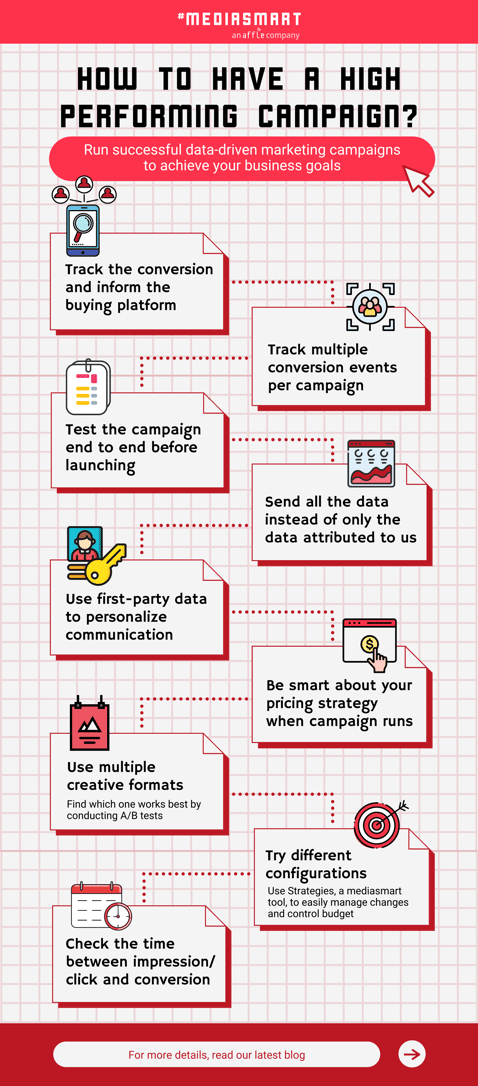Blog
Announcements, analysis and opinions on industry trends around the mobile programmatic world.

Subscribe now, and receive the latest programmatic content directly on your inbox!
Thank you for subscribing to our newsletter
Marketing the right way is important to build a brand. You need to have a plan to use your existing data for its useful insights if you expect your revenue to increase. Mediasmart allows you to run successful data-driven marketing campaigns that you can optimize with our algorithms and or manually to achieve your business goals. Tools such as ours enable effective media buying and can be used to target in a personalized manner to, eventually, improve ROI. We also allow you to get a better understanding of your customer journey with a holistic view of what your customers are doing digitally but also in real life.
The best possible way to have a high performing campaign is to -

Keep reading to learn more about each of tips.
- Track the Conversion and inform the buying platform
- Set Multiple Conversions per campaign
- Test the campaign end to end before launching
- Send all Data Instead of Only Data Attributed to Us
- Use First-Party Data
- Be smart about your Pricing strategy
- Use multiple creative formats
- Try different configurations
- Check the time between Impression/Click and Conversion
Track the Conversion and inform the buying platform
If you expect algorithms to make decisions on the go to improve campaign performance, you will need to inform the machines about how that performance is measured (set KPIs) but also about how well the campaign is doing against the goals, and if possible with granularity. You will want the algorithm to have the correct information to be able to make the right decisions, usually, that information is passed either via an MMP (Mobile Measurement Platform) for apps, Dynamic Pixels on websites and/or Server-to-Server (S2S) connections for any other type of conversion.
Set Multiple Conversions Events per Campaign
With mediasmart, you can track up to 5 post-click events and optimize towards the event you consider more important, i.e., the one that defines your campaign success (for example: a client reaching the Thank you page after completing a purchase on your e-commerce).
Before launching, test the campaign end-to-end
To get insights from the actions generated by the campaign, the tracking system must work properly. To ensure its perfect functioning we recommend marketers to test the campaign end to end before launching it. This can be done by using a test URL, faking an impression, generating the conversion and checking that the conversion information came back to the system.
Send all Data Instead of Only Data Attributed to Us
Fully linked to the previous point, sending the conversion data from all your existing campaigns, especially if it is granular, will shorten the learning period of our algorithm and will dramatically increase its efficiency for optimisation.
Use First-Party Data
You use your own data to personalize communication to the user based on their past behaviour or preferences (i.e. they already downloaded your app but didn’t purchase) or present behaviour (what is their interaction with your marketing campaign). Our algorithms allow you to figure out similar data in the pre-existing information.
Be smart about your Pricing strategy
In the beginning, we recommend the Cost Per Action (CPA) to be what you have naturally observed when the campaign was running only with a configured Cost Per Click (CPC), or even a bit higher if you do not want the volume of the campaign to decrease too much, and also to account for the effect of the second price bidding. You can then decrease the CPA little by little based on the results you observe as the campaign keeps running. This is easily done using our Strategies.
Use multiple creative formats
Be innovative with your creatives. In fact, you can use rich media which is dynamic. Here you can use different elements, choose placement (fullscreen or other sizes), touch/swipe-based interactions and customize many more options. We recommend you A/B test and then prioritize the ones that convert best, especially, the ones that give you the highest incremental value.
Try different configurations
Run multiple configurations of the campaign in parallel to see the performance of different variables in real-time, which is particularly easy with the mediasmart tool: Strategies. Use strategies for buying media with different prices in different countries/regions and run multiple line items: different audiences, different publishers, etc. A/B testing will allow you to select a highly favourable strategy that suits your goals (say, a lower CPA).
Check the time between Impression/Click and Conversion
Depending on the type of conversion the time difference between the impression, click and conversion could be big, especially in the case of drive-to-store campaigns where the average time to conversion ranges up to 15 days. In the particular case of App marketing campaigns or Digital conversions, the time between the click and the conversion is an important factor to take into account, because of ad fraud behaviours such as click-baiting. Mediasmart machines will automatically check for fraudulent patterns in that sense which will help improve campaign performance, as the algorithm will stop buying on the publishers that generate that type of behaviour, avoiding budget wastage.
Conclusion
Mediasmart tracks information on impressions and clicks and feeds information to algorithms to make informed decisions. The shared data and results with the players allow them to be not blind and decide strategically based on their goals.
Topics: programmatic, machine learning, automation, manual optimization


